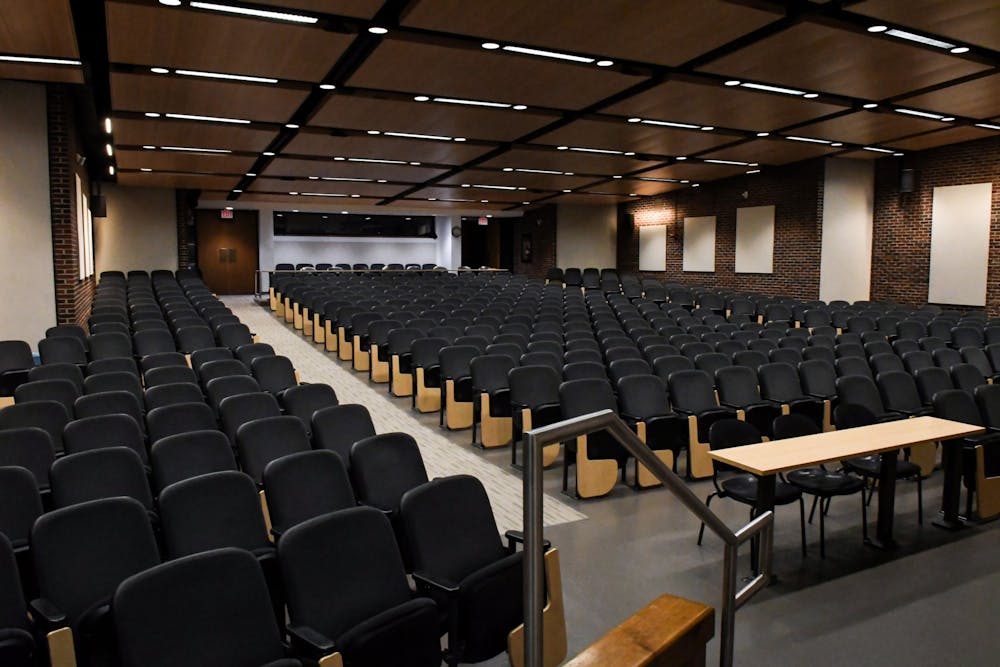
Professors have slightly over a week to adapt their classes to an online format.
Credit: Sukhmani KaurPenn faculty are grappling with how to adapt their classes to an online format after the University announced all classes will move online for the rest of the spring semester to prevent the spread of coronavirus.
Professors have a little over a week left to prepare for online classes, which begin on March 23. Many professors expressed concern for possible technological and logistical difficulties and disappointment that students would lose the experience of being in a classroom setting.
Mechanical engineering and applied mechanics professor Thomas Cassel said the loss of a classroom dynamic is a concern for many professors. Religious Studies professor Justin McDaniel, who teaches the seven-hour "Existential Despair" course which meets once a week, agreed, adding that he was concerned about maintaining student participation in an online setting.
"There’s something that comes with in-person discussion and when you’re all kind of reading intensely together," McDaniel said. "It makes the course kind of magical.”
He said the "Existential Despair" course consists of four hours during which students read silently and three hours for discussion. The online class will only feature the three-hour discussion, McDaniel said.
“Pedagogically, it’s difficult. It’s not ideal, but there’s a lot of difficult things in the world and you have to struggle through them," he said.
Professors also expressed concern for international students who could face large time differences to attend online classes if they are conducted in real-time as opposed to pre-recorded lectures. Cassel said it was possible he would hold classes in real-time while issuing waivers on a case-by-case basis for those unable to participate at that time.
“How we’re going to accomplish this in real-time with students in very different time zones is what we’re wrestling with right now," Cassel said.
McDaniel said it was unlikely he would hold synchronous classes given the time differences.
“How can you expect a student to wake up at 3 a.m. and then attend your classes? That’s not fair," Turkish language lecturer Feride Hatiboglu said.
Professors said they are also currently finding alternative ways to conduct exams and labs.
Physics professor Kenneth Lande, who teaches PHYS 101, said he currently sees no solution for how to hold a final exam or replicate labs. He added, however, he may require students to watch videos to substitute for the lab component of the class.
“I think it’s our job to teach and the assessment is really secondary in my book,” he said.
Hatiboglu added that instead of a timed exam, her students will have a take-home exam in TURK 022.
Cassel said he is currently figuring out how to hold the final exam for his class, Engineering & Applied Sciences 545, online.
Professors said they are becoming familiar with online conference platforms such as Zoom and BlueJeans and some will test-run online classes next week with a select few students.
Both Lande and Hatiboglu said they have recruited students to attend an online trial class next week to provide them with feedback on how to improve the class.
Cassel said the faculty members in the Engineering Entrepreneurship program, of which he is the director, will meet on March 16 and 17 to determine which online platforms to use and will then do trial runs to see how the online classes will be conducted.
The Engineering Entrepreneurship program offers an undergraduate level minor and a graduate level certificate for students interested in technological innovation with a focus on engineering and science.
Lande, who has taught at Penn for 60 years, said he has been preparing for online classes since mid-February after realizing the novel coronavirus pandemic would be on par with or worse than the 1918 influenza pandemic and 2009 H1N1 pandemic.
Vice Provost for Education Beth Winkelstein emailed all teaching faculty on March 9 asking instructors to familiarize themselves with online-teaching tools in case Penn decides to cancel in-person classes.
“It’s a major change in the way we do things, but it may also be an opportunity to learn how to teach differently,” Lande said.
Lande said he will write equations on sheets of paper and show them to the camera. He added if the class uses Zoom, a video communications software, any student can stop him and ask questions. Lande said he has not used Zoom in an academic setting before but will do his best to recreate the classroom environment.
Hatiboglu said she has previously used phone calls and Zoom to encourage students to speak more Turkish. Hatiboglu said the Penn Language Center and the School of Arts and Sciences are conducting optional daily technology trainings on weekdays before online classes begin.
“Online learning staff and advisors at Penn are excellent, but they’re overwhelmed right now," McDaniel said. “It took me a long time to learn these things and for other professors who have never done it, it’s going to take them a lot longer to do with less staff resources."
Despite the uncertainty surrounding online classes, some professors said they are determined to do whatever is necessary to preserve the learning environment for students.
Cassel said the Engineering Entrepreneurship program has arranged for guest speakers to join through video conference. He added that he is confident in the University’s technical team to help professors run online classes as smoothly as possible.
“I have the greatest admiration for Penn and the greatest desire to be a good cog in this great machine," History professor Arthur Waldron said, echoing Cassel's thoughts. "Ask me to do, I will do to the very best of my ability."
The Daily Pennsylvanian is an independent, student-run newspaper. Please consider making a donation to support the coverage that shapes the University. Your generosity ensures a future of strong journalism at Penn.
Donate




